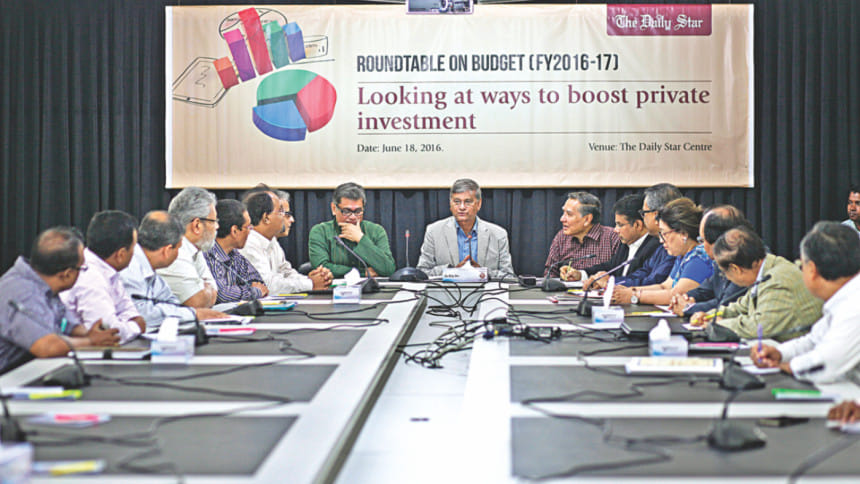Businesses want predictable tax policy

Frequent changes in tax structure and other policies hamper business and future investment plans, analysts said yesterday.
“If the tax structure is like this, let it be like this for the next few years so that we can plan ahead,” said Rupali Chowdhury, president of the Foreign Investors’ Chambers of Commerce and Industry.
Businesses sit with the National Board of Revenue and other authorities every year but the tax measures never reflect any of the recommendations, she said.
“Every year we are talking about some kind of development in terms of tax regime. But what we see, after having discussions with the NBR and other authorities, is completely different.”
Chowdhury’s comments came at a roundtable organised by The Daily Star on ways to boost private investment.
Discussants said the lack of predictability in policies including fiscal measures is one of the problems in accelerating investment.
“Bureaucracy, the government and businesspeople must work together. We must have some confidence in each other that everybody is not out there to evade tax,” said Chowdhury, also the managing director of Berger Paints Bangladesh.
Khondaker Golam Moazzem, additional director of research at the Centre for Policy Dialogue, said predictability is very much needed for industries; otherwise it is very difficult for industries to go for long-term investment plans.
Subsequently, he suggested framing the tax policy in such a way that entrepreneurs are able to forecast the tax regime for three to five years.
The government should also share its projections on how much tax it will get through a measure or how much it will lose for giving a certain incentive or tax benefit to industries, Moazzem said.
For this, the government can frame fiscal measures in two phases.
The tax authority would receive proposals from businesses in October, which it will review and discuss with the businessmen during the February-May period.
In that way, the entrepreneurs will know which proposals were accepted and can form an outline of the coming fiscal measures.
The entrepreneurs will be the least disheartened if they are consulted and informed ahead of the framing of fiscal measures, he said.
“Fiscal instruments should be innovative so that it can support production and investment. It should be framed in a way that it is predictable and transparent.”
Abdus Salam Murshedy, president of the Exporters Association of Bangladesh, said entrepreneurs have to run factories through diesel-based generators in the absence of uninterrupted electricity supply. It increases the costs of business, he said.
“Now suddenly we have started receiving letters that VAT is applicable on the fuel we have bought.”
Murshedy opposed the hike in source tax to 1.5 percent in the forthcoming fiscal year from 0.6 percent on exports, as apparel factories have to invest in improving workplace conditions and labour standards.
“I do not think the increase in tax is logical when remediation and relocation in factories are on,” he said, while expressing his fear that the number of firms to be able to pay tax at the new rate would decline slowly.
Ahsan H Mansur, executive director of the Policy Research Institute of Bangladesh, said the tax policy needs to be predictable.
“At the same time, it cannot stay the same because our tax system is very distorted, very inefficient, in all respects. So, it has to be changed but the change has to be in a predictable manner.”
He said the government has to make up its mind on where it wants to go.
It cannot maintain the NBR in the same way that it was run in 1947 and before, he said, while calling for reforms and modernisation of the tax administration and policies.
Mohammed Humayun Kabir, chief executive of Beximco Group’s jute and ceramics divisions, lambasted the government for increasing tax at source for all export industries irrespective of their profits or losses.
Based on the sourcing of raw materials, he categorised industries into three types: industries that procure raw materials locally (jute), industries that get duty-free import benefits (garment) and industries that pay duty for import of raw materials (ceramics).
“All these industries have to pay the same tax. Is it equitable?”
He also opposed the shift to minimum tax for the next fiscal year instead of final settlement now.
Until now, there was a provision to claim tax rebate against tax at source during import, and companies could claim tax rebate during payment of final tax.
In the latest provision, the source tax will be considered to be the minimum tax.
“So far, source tax was treated as the final settlement. But it will turn into minimum tax for the latest change,” he said, adding that the tax burden might rise if the minimum tax is imposed irrespective of profit or loss.
This tax measure will discourage diversification of the export basket, he said.
Industries that have to import raw materials by paying 5 percent advance income tax such as ceramics will face a higher tax burden for the hike in source tax rate.
“The tax structure has become anti-investment. How do you expect investment then?”
Kabir, also a chartered accountant, criticised the government for imposing surcharge on wealth tax, as it would discourage capital formation and private investment as well.
Sardar Md Amin, vice-president of the Real Estate and Housing Association of Bangladesh, said the government increases the tax collection target every year, although not all sectors register growth.
Except for plush areas in Dhaka and Chittagong city corporations, the rate of advance income tax for land and apartment registration in other areas of the two cities has been increased to Tk 1,000 per square metre from existing Tk 600.
MA Mannan, state minister for finance and planning, also spoke at the discussion.

 For all latest news, follow The Daily Star's Google News channel.
For all latest news, follow The Daily Star's Google News channel. 



Comments